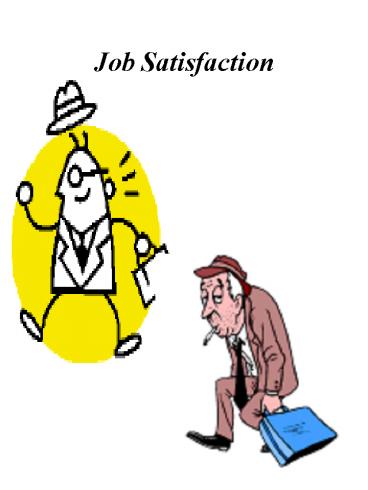Job Satisfaction
1 / 14
Title: Job Satisfaction
1
Job Satisfaction
2
Job Satisfaction Model
Positive Affect (e.g., personality trait)
Job environment (objective characteristics)
Subjective interpretation of job environment
Job Satisfaction
3
Measurement
- Job Descriptive Index (JDI)
- Assesses five types of satisfaction, satisfaction
with - The work Itself
- Supervision
- Co-Workers
- Promotion
- Pay
- As well as the Job In General Scale (JIG)
Minnesota Satisfaction Questionnaire (100 items
or a 20-item short form) Five point scale from
very dissatisfied to very satisfied
Faces Scale
4
Commitment
Affective (emotional connection)
Normative (obligation, allegiance)
Continuance (cost assessment)
Job (e.g., specific position within an
organization) Organization (e.g., I was taught
to believe in the value of remaining loyal to one
organization) Occupation (e.g., career)
5
Organizational Justice
Types
- Distributive (outcome or results
- fairness)
- Equity (based on contributions)
- Equality (all have an equal chance)
- Need (those with greatest deficits)
- Procedural (fairness of systems
- or processes)
- Interactional
- Interpersonal (respect, personal
- concern for the impact of an
- action)
- Informational (knowledge,
- rationale as to why an action is
- taken)
6
Organizational Citizenship Behavior
(Going beyond the job duties)
- Five dimensions
- Altruism (helping/assisting others)
- Conscientiousness (follows rules/procedures,
careful, responsible, diligent) - Courtesy (respectful of others)
- Sporting (avoid complaining, gossip)
- Civic virtue (participation in the routine
aspects of organizational politics
self-sacrifice)
Note Possible short-term usage and positive
impression management technique (e.g., higher
performance ratings) Usage related to perceptions
of procedural justice
7
Satisfaction Turnover
Job Satisfaction
Thinking of quitting
Intention to search
Age/tenure
Intention to quit/stay
Probability of finding an acceptable alternative
Quit/stay
8
Influences on Attendance
3. Personal characteristics Education
Tenure Age Sex
Family size
7. Ability to Attend Illness and
Accidents Family responsibilities
Transportation problems
2. Employee values and job expectations
1. Job Situation Job scope Job
level Role stress Work group size
Leader style Co-worker relations
Opportunity for advancement
4. Satisfaction with job situation
6. Attendance motivation
8. Employee attendance
5. Pressure to attend Economic/market
conditions Incentive/reward system Work group
norms Personal work ethic Organizational
commitment
R. M. Steers and S.R. Rhodes, Major Influences
on Employee Attendance A Process Model,
Journal of Applied Psychology, 63 (1978), p.
391-407.
9
Correlations with Satisfaction
Satisfaction
Performance .17 - .30 Attendance -
.25 Turnover - .40 Job Involvement .45
Commitment .53
10
Downsizing (Layoffs)
- Frequency (on the rise)
- Record 2001 Layoffs
- Effects on those laid off
- Job acquisition (e.g., finding new jobs,
under-employment, transfer of skills/knowledge) - Health effects
- Psychological (anxiety, depression,
self-esteem, stress) - Physical (e.g., gastrointestinal problems,
ulcers, headaches, sleep loss) - Effects on those surviving
- Less trust, commitment,
- Demotions, less hours salary
11
Some Euphemisms for Layoffs
Consolidation Cost-containment
Downsizing Involuntary attrition Involuntary
separation Letting you go" Outplacement
Reduction in force (RIF) Reengineering
Restructuring Rightsizing Streamline
operations Staff/workforce/headcount reduction
Termination Voluntary termination (part of a
"performance improvement plan" )
12
Mergers Acquisitions
- Job Losses
- Integration Issues
- Control (conflict)
- Cultural fit
- Commitment, identification of
- employees
Some mergers AOL Time Warner Vivendi -
Seagrams HP Cpmpac BP -
Amoco Exxon Mobil Pfizer Warner-Lambert
Some Acquisitions eBay PayPal Chevron -
Texaco Pfizer - Pharmacia
13
Workplace Violence Examples
- In 1995, 88 workplace homicide victims were
killed by a current or former work associate,
almost double the number from 1994 (Bureau of
Labor Statistics, 1996) - A former employee fired a month earlier boarded
a flight and shot his former supervisor to death,
then the pilots, and ultimately killed all 43 on
board (Hackett and Lerner, 1987) - A disgruntled federal employee shot and killed
his supervisor and a union representative (Merl
Corwin, 1998) - A Xerox employee shot seven co-workers to death
(Arnett Booth, 1999) - A hotel employee shot four of his co-workers to
death (The Detroit News, 1999) - An employee, who had been fired that day,
returned to the store and shot and killed his
supervisor and a co-worker (St. Petersburg Times,
2000) - A survey of Fortune 1,000 companies reported
workplace violence as the most important security
thereat (Jarman, 1999)
14
Workplace Violence
Perceived organizational act(s) of injustice or
trust violation (e.g., breach of psychological
contract, rules violations, broken promises,
abuse of authority, unfair criticism, insults)
Situational factors (e.g., stressors, group
relations, norms)
Personality factors (e.g., aggressive tendencies,
anger, hostility)
- Specific employee reaction (e.g., revenge,
retaliation) - Direct vs. Indirect
- Physical vs. Verbal
- Active vs. Passive







![Job Satisfaction Definition by Authors ,Components of Job Satisfaction]](https://s3.amazonaws.com/images.powershow.com/10261310.th0.jpg?_=20250303039)























